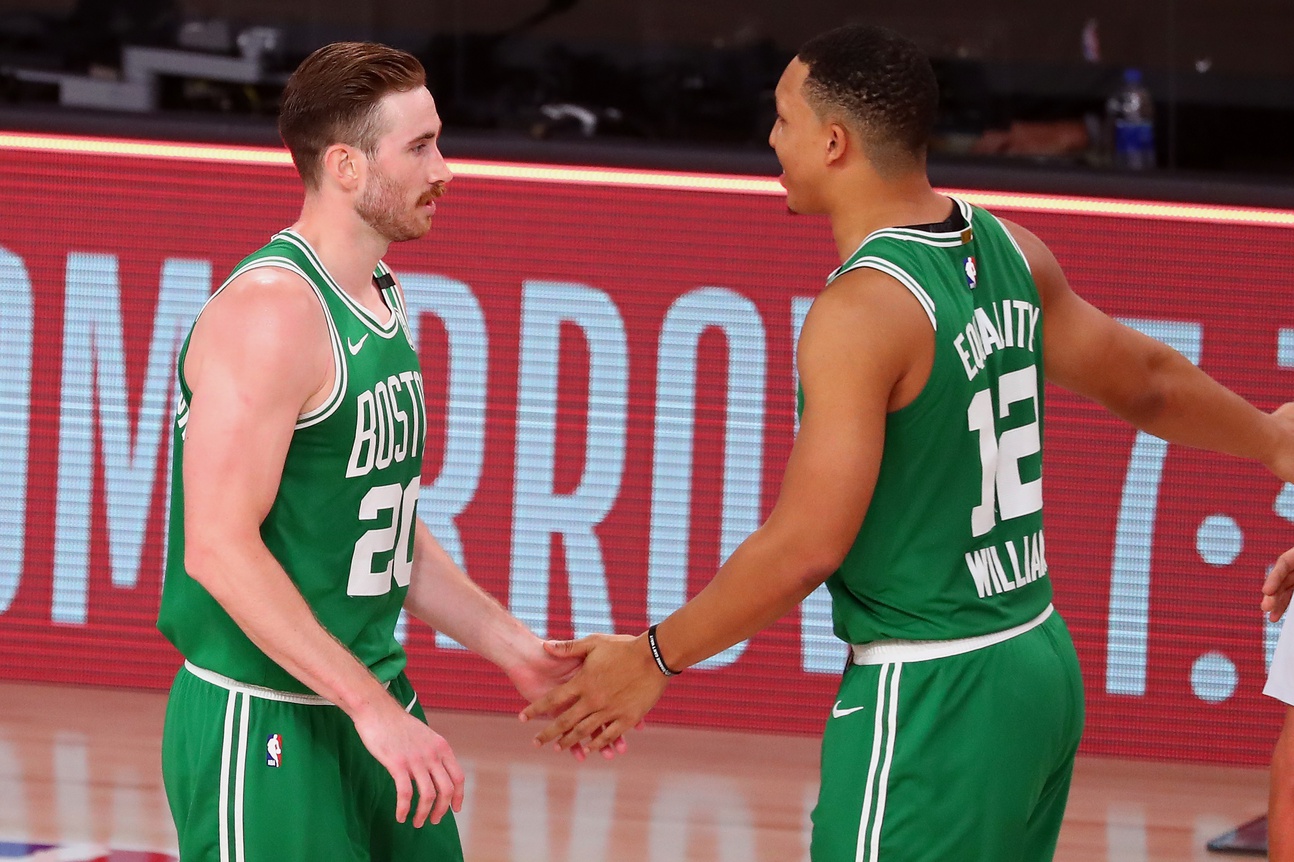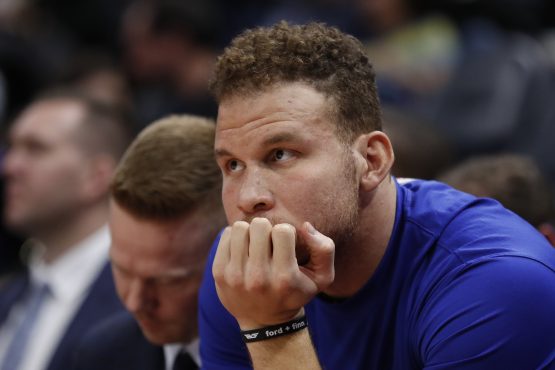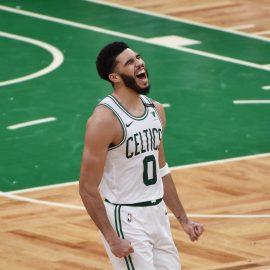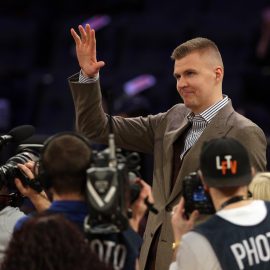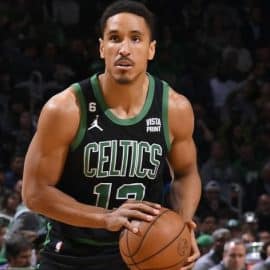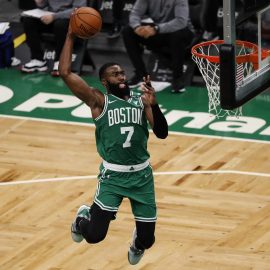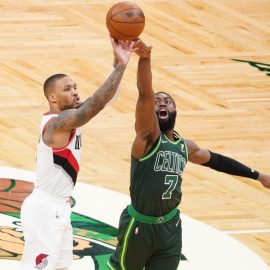Every morning, we compile the links of the day and dump them here… highlighting the big storyline. Because there’s nothing quite as satisfying as a good morning dump.
Hayward's opt-out viewed more as a formality. League source said it's still possible he returns to C's in restructured deal, unless, ala Al Horford, he receives home run offer from Atlanta or New York. "Gordon doesn't even know right now."
— Mark Murphy (@Murf56) November 19, 2020
Gordon Hayward didn’t actually walk away by declining his $34.1 million option with the Celtics last night.
The playmaking power forward, his three-season tenure with the team a largely snake-bitten experience, merely opened up an entirely new network of options, including a diminished chance that he might return under a restructured deal.
According to a league source familiar with negotiations between the two sides, this last possibility is indeed still on the table, as counterbalanced as it is by the prospect of making more money elsewhere than the Celtics are willing to pay.
“Gordon doesn’t even know yet,” said the source. “No one has indicated anything.”
Next time you go to a restaurant take a good look around you.
In a certain sense, every other customer you see is there for pretty much the same reason you are: They’re there to eat.
But if you look just a little bit below the surface, the reasons for being there begin to diverge…
Some people are there because their significant other chose the restaurant. Some people are there because they like the ‘atmosphere’, some people are there because they like something on the menu that you don’t particularly care for. Some people are there because it was the first place they thought of, other people are there because it’s close to home. Some people are there because the wait was too long at their first choice.
And some people are there for pretty much the same reasons you are.
My point is this:
The differences that exist below superficially common activities is a human trait. It exists everywhere.
It exists among fanbases for teams.
On a fundamental level, if you’re reading this, it’s because you like the Celtics. I’m writing this because I like the Celtics. But the thing is, not everyone who likes the Celtics has the same priorities.
For a significant chunk of people, cheering for the Celtics is a sort of shared identity that makes a community possible. But for these people, their priority isn’t really following a team that wins championships, it’s being part of a community.
And you know what?
That’s fine. That’s pretty much how all fanbases work. It’s something that allows otherwise disparate individuals to make a connection, have something in common to talk about, get crabby about, get excited about and so forth.
Ostensibly, every fanbase wants their team to win a championship. In reality, though, the community dynamic dominates.
And it’s pretty much a given that if winning conflicts with community identity, community identity will carry the day. Because that, too, is who–and what–we are as humans. We’d rather conform.
Look, mullets were never attractive. But there was a point in time when lots of guys had them. Why? Because once a certain threshold was passed, community pressure led guys to make tonsorial choices which they knew, deep down inside, were unappealing.
There is a section of the Celtics fanbase which does not like Gordon Hayward.
There is no sound basketball-related basis for this dislike.
But this dislike has come to be a defining trait of that community. And given the choice between disavowing that trait and wanting the C’s to retain a player who is demonstrably better than anyone that they have put forth as a return in a sign and trade scenario, community pressure wins. They’d rather see Hayward leave than win. And deep down, in their heart of hearts, they know this–the same way guys with mullets knew that they didn’t really look good with mullets.
The C’s were lucky last summer. They were able to replace Kyrie Irving with Kemba Walker. I’ve seen no scenario that would allow for such a replacement of Hayward’s abilities.
Mark Murphy’s tweet last night means that Hayward may not be through in Boston.
Right now, there are quite a few factors Hayward has to consider: The teams that can offer him the most money outright are not very good–and not likely to get better any time soon.
The Pacers can land him, but only if they do a sign and trade with Boston, which gives Boston a fair bit of leverage and ultimately leaves Gordon playing for a team that’s close to home but only a middle-of-the-road outfit.
Now money & being close to home are powerful inducements–and they may yet carry the day.
However, I keep going back to Hayward’s decision to push for an early return from that ankle sprain, which meant missing the birth of his son.
I mean that’s recent history. That only happened two months ago. And that action seems to be indicative of a guy who is extremely competitive. A guy who wants to win.
The C’s give Hayward his best shot at winning a title.
The question is how much money Hayward is willing to leave on the table in order to have a legitimate shot at winning a championship.
Because that’s what this is all about, really. Money versus winning.
If Gordo’s people and Ainge’s people saw eye-to-eye on money matters, we wouldn’t even be having this conversation. Hayward would be locked up for another three or four years.
But if the Celtics represent Hayward’s best chance at winning it all, Hayward represents Boston’s best chance of winning it all. And that gives Hayward a fair bit of leverage.
The C’s are over the soft cap and will be for the foreseeable future. That means that for the C’s as well, this negotiation comes down to money versus winning.
Paying Hayward more doesn’t necessarily cramp the Celtics’ flexibility. It just costs the team more. In a vacuum, team officials can say that winning is their highest priority, but when push comes to shove, are they prepared to pay enough to win?
Right now, the Celtics, Hayward, and yes, even a substantial chunk of the Boston fanbase are facing a question: How much do you value winning?
Because Hayward can make more money playing for a team with no chance of winning it all, Boston can save money by letting Hayward walk, and get worse in the process, and fans can be glad that Hayward–and Robyn–are no longer contaminating the team with their oh-so-Midwestern vibes, while cheering for a team that will almost certainly be worse than last season’s.
Page 2: Where other business was transacted
The short-lived Vincent Poirier experience in Boston is over. The Boston Celtics announced Thursday they have traded Poirier and cash to the Oklahoma City Thunder in exchange for a conditional second round pick.
Generally, the cash is to cover the cost of waiving the player, but the Thunder haven’t yet announced their intentions for Poirier. The French big man thanked Boston in a tweet, saying “Thank you Celtics for your warm welcome and this great year ! To my teammates, coaching staff and the fans see you soon.”
Boston Celtics center Enes Kanter has opted into his $5 million contract for the 2020-21 season, a league source tells ESPN.
— Tim Bontemps (@TimBontemps) November 19, 2020
Boston has declined a qualifying offer to guard Brad Wanamaker, making him an unrestricted free agent, source tells ESPN.
— Adrian Wojnarowski (@wojespn) November 19, 2020
Kanter’s decision to opt in is not surprising. While he might ordinarily have been able to land more money due to this being a particularly thin free agent class, this is not an ordinary year.
That the C’s did not extend a qualifying offer to Wanamaker is also not surprising. Had they done so, Wanamaker would have gotten a no-trade clause. This doesn’t necessarily mean the C’s are moving on from Wanamaker either. There was a team option on Brad’s previous contract that Boston didn’t pick up in the summer of 2019 and he still ended up playing with the C’s.
The C’s are probably aiming for roster flexibility right now, and depending on how things shake out, they may come back to Wanamaker closer to the start of the season.
The rest of the links
NBC Sports: Forsberg: What Hayward’s decision means for the player and the Celtics
MassLive: Boston Celtics Mailbag: Gordon Hayward for Klay Thompson? Kemba Walker fence mending? And my favorite books (Subscription required–unless you can read really fast)
Add The Sports Daily to your Google News Feed!
